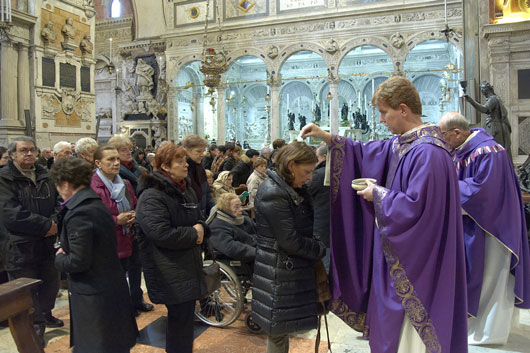
This year Ash Wednesday falls on February 18th, which means it is right around the corner and it’s time to get educated about this holiday. If you are embarrassed to admit that you have mistaken the ashes on people’s foreheads for dirt, don’t be. A lot of people don’t know really know the history of Ash Wednesday and aren’t clear what this holiday is truly about. But we’re about to change that. According to nun and Catholic Visionary, Sister Joan Chittister, “Lent [and Ash Wednesday] is the opportunity to change what we ought to change but have not. Lent is about becoming, doing and changing whatever it is that is blocking the fullness of life in us right now.”
Here are 7 facts about Ash Wednesday history.
1. It is observed by Western Christians
While some holidays are specific to certain branches of Christianity (or pretty much any religion, for that matter) this holiday is observed across all Western Christianity, including Catholics, Lutherans, Methodists, Anglicans, and Presbyterians. Which means that hundreds of millions of people around the world will be observing this holy day.
Read Related: Lentils for Lent: My Family Recipe

2. What are the ashes all about?
The ashes are meant to make a person feel humble and serve as a reminder that we are all flawed and life moves quickly, so we need to take a step back and reflect. They are “a traditional sign of mourning and repentance—are meant to remind people that life is short.” As they are applied to one’s forehead they are accompanied by the words “remember, Man is dust, and unto dust you shall return,” which is a reminder that we are mortal. So no, it’s not just dirt, and yes, there is a meaningful purpose to wearing these ashes all day.

3. Where do the ashes come from?
No, these are not just dirt from your local park ground. The ashes that are applied to your forehead on Ash Wednesday are actually made from “blessed palm branches from the previous Palm Sunday. The ashes are sprinkled with Holy Water and incensed before distribution.”

4. This holiday is not exactly a celebration
This day marks the first day of Lent, which is a 40-day (46-day if you are counting Sundays during the 6-week period) period of reflection, penance and fasting; in other words, those who observe this holiday will not be partying. They will be making sacrifices in an effort to prepare for Easter Sunday, when they will attain redemption. On Ash Wednesday many people fast and attend church services. During Lent, which follows, people typically give up some everyday luxuries (think caffeine, sugar, alcohol, meat…) in an effort to atone for their transgressions and prepare for Easter Sunday, when they hope to attain redemption.

5. When does it occur?
This holiday doesn’t take place on a specific date each year (as Christmas always falls on December 25th). It does, however, always occur 46 days (40 weekdays plus 6 Sundays) before Easter Sunday. This isn’t an arbitrary period of time. As per the said the history of Ash Wednesday, 40 days represent the 40 days that Jesus spent fasting in the desert.

6. You don’t have to keep the ashes on all day
While many people opt to keep the ashes on their foreheads throughout Ash Wednesday (or until they come off on their own), it’s actually not required that you do. You can wash your face immediately after the service if you choose, though you’ll notice a lot of fellow observers choose to wear their ashes for the entire day to display their commitment to their religion and their promise to observe Lent.

7. What is the biblical significance of Ash Wednesday?
Christianity Expert, Mary Fairchild, explains that when it comes to Ash Wednesday history, “the Bible does not mention it or the custom of Lent, however, the practice of repentance and mourning in ashes is found in 2 Samuel 13:19; Esther 4:1; Job 2:8; Daniel 9:3; and Matthew 11:21.” In other words, this is a holy day and honored tradition, but it is not mentioned in the bible. That said, according to a Huff Post piece, “scholars of Christianity date the tradition of a 40-day fasting period back to 325 A.D.”











